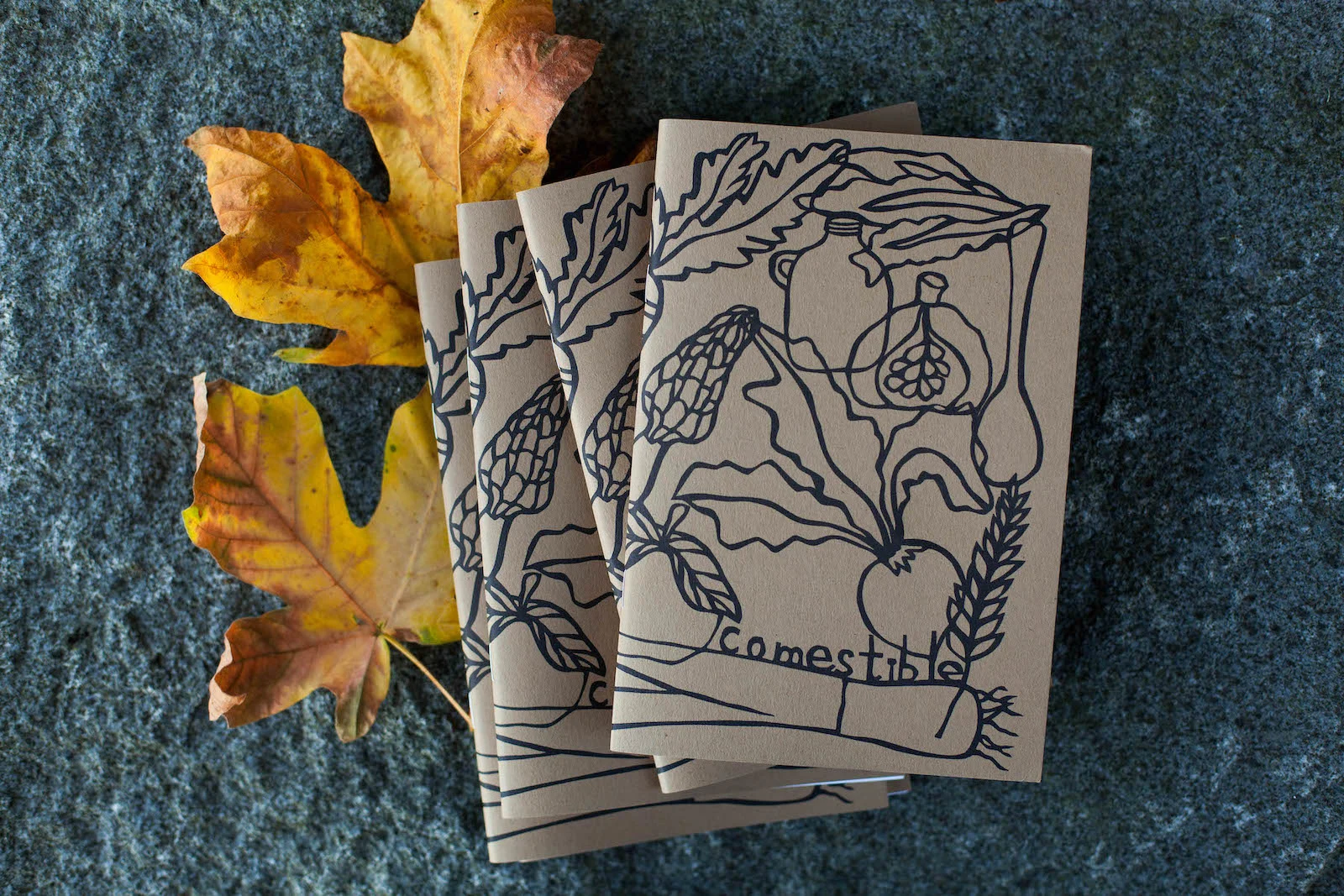Making More With Less: The Bootstrap Cook Enjoys Food in Hard Times
- 30 April 2020
- ByElizabeth Rushe

Jack Monroe is a food writer and anti-poverty campaigner from the United Kingdom who is known as the “Bootstrap Cook,” for her budget friendly recipes, born out of her own experience relying on a food bank to feed her and her son during a difficult period of her life. Jack is well known for championing canned goods (her fourth cookbook, published last year is Tin Can Cook - seventy-five recipes based on tinned and dry ingredients). Jack is known for highlighting ways you can extend the nutrition of what you have - make a pickle with leftover vegetables, turn leftover salad into a pesto, or preserve mushrooms by drying them in the oven, which also enhances their flavor!
Described by Nigella as “Wonderful and inspiring,” Jack’s recipes show that even if your ingredients are limited, you can get your nutritional bases covered and still find joy and playfulness at meal times. “I am probably proudest of this book out of all of them,” Jack says on her website about Tin Can Cook, “because it’s the book I wish I’d had when I was in my worst of times, trying to feed myself from food bank boxes with little energy, no self esteem, and feeling like most recipes were out of my reach.” Jack raised over $55,000 to be able to donate tins of food and copies of the book to food banks to go directly to those who need it most.
Jack recently became a TV host for the first time, co-hosting the cooking show Daily Kitchen Live on the BBC for a two week run this April, aimed at helping people with cooking tips and ideas during the difficult times caused by Covid-19. Jack’s sixth cookbook is also coming out soon, Good Food For Bad Days - seventy-five “depressipes” as Jack calls them, recipes for delicious food that is easy to make when you’re feeling low.
It’s not only access to ingredients that people are struggling with right now, but also the weight of the current situation on our mental health is heavy, and not everyone has the time, attention span, or energy to cook. Also, after six weeks of isolation cooking, I’m over it y’all. Instead of the more time-intensive sourdough, I make soda bread. For very little effort you get amazing fresh baked bread at home with a quick one-hour turnaround - and you probably have all the ingredients already.
A Recipe I'm Loving: Isolation/Irish Soda Bread
4 cups plain flour
1 tsp baking soda
1 tsp salt
2 cups room temperature buttermilk (or, lately I’ve been using kefir). If you don’t have either, you can simply add a tablespoon of lemon juice or vinegar to 2 cups milk and leave the milk and lemon to sit for at least ten minutes to curdle before using
Play around with adding your favorite herbs and spices if you have some on hand: try chives, rosemary, or your favorite cheese mixed into the dough
Whisk the flour, baking soda and salt together in a large bowl and then slowly incorporate the liquid, mixing slowly. Once combined, the dough should look “craggy.”
Wet your hands and knead the dough loosely in the mixing bowl a few times to give the dough a smoother surface.
Preheat the oven to 400°F.
Transfer to a floured baking tray, use a wet knife to make a slit in the dough all the way down, and bake for 45 minutes (or until a toothpick comes out clean, depending on your oven).
Since most countries are advising their citizens to be prepared to have enough food at home for two weeks in case we get sick and need to quarantine ourselves, and that we also shouldn’t be going out much anyway unless it’s essential, it’s no surprise that people have stocked up to prepare for the uncertain times ahead, and this has led to shortages of staples like flour, pasta, and rice. Where I am based in Germany, this has a cute name - “Hamsterkauf,” literally hamster-buying.
Many of us are relying on odds and ends we may well have long forgotten about in our cupboard shelves, or are dealing with difficult economic circumstances and can only afford certain ingredients. As Jack said of their goal on Daily Kitchen recently, “Taking something that you’ve got and expanding it to make something bigger and something better and a more substantial meal out of it.”
Jack was a young single parent who turned to blogging about ten years ago as a way to share cheap family recipes for no more than £10 per week (about $12.30). She writes her recipes keeping in mind those people who use food banks, who may not always be able to get the exact ingredients, just whatever is available or they may have on hand at home. The cost for each recipe is carefully calculated down to the last gram and pence - some recipes cost as little as two pence (based on having some items in your cupboard already, like flour and eggs).
Jack has recently taken to Twitter to offer recipe advice to her over a quarter of a million followers, based on pictures of their pantry shelves, or lists of what ingredients people are stuck with. Some of Jack’s advice: not sure how to make use of items you’ve stocked up on? Try recreating a traditional dish using substitutes that you have: for example, one person scored some discount beetroots and mushrooms, Jack recommends her beetroot wellington, a veggie take on the traditional dish of beef fillet wrapped in pastry.
If you’re not sure how to use up your leafy greens like chard, Jack has a few ideas, “Fold it through cheesy pasta, use it on top of pizza, make a colourful pesto with it, make cheesy pasties, or use it in sausage rolls, or add to a curry, or stir fry with garlic and lemon....,” she says. If you ever have leftover stock, make a risotto with it (and don’t worry if you don’t have arborio rice either).
After bringing her recipes to life in person on Daily Kitchen Live, Jack shared online that she has transformed her garden shed into a new kitchen studio so hopefully we’ll be seeing more of her live cooking demos. She has spoken about how she’s turned down similar opportunities before due to lack of confidence in herself, it’s wonderful to see her step up to the challenge and believe in herself, as she’s an amazing host: hilarious, and her energy is heart-warming and reassuring. She can barely contain her excitement to share her cooking as she bops around the kitchen.
In one example recipe on the Daily Kitchen, they make a Calzone with plain flour - since a lot of people aren’t able to find bread flour or yeast at the moment, the Calzone dough is plain flour enriched with an egg, so it doesn’t require those sought after ingredients.
Some of Jack’s pantry tips range from common sense - like buying bottled long-life lemon juice to see you through this period when fresh produce might not be available, to lightbulb idea replacements like using a splash of black tea in recipes which usually call for a splash of red wine. Jack wrote frankly about her alcoholism last year, and explained on the show that her home is strictly no-alcohol. When developing a slow cook recipe, she was wondering how to replace red wine and made the connection between tannins that are in both wine and tea for that depth of flavour. So it’s not a typo that her veggie lasagne calls for 100 mls of black tea.
The show is rounded out by experts including an NHS doctor Rupi Aujla, whose catchphrase is to, “add one more vegetable to your plate at every mealtime” and a cookbook author Shivi Ramoutar whose new book is about freezing. A couple of Ramoutar’s great “frosted” tips (sorry) were:
Break down meat or fish to finger size lengths (sorry for the unpleasant imagery that may conjure); freeze them, you can then easily cook them from frozen at that size, taking just what you need instead of defrosting a bigger piece
Blanche and freeze vegetables as soon as you get home, to stop them deteriorating: I find as a single-person household, this would definitely help me avoid food waste.
Stocking up on multi-use ingredients is a tip that’s helped me; making chicken stock from a roast chicken is worth it for the delicious aroma that will fill your home (if you’re into that), but then you also get a pot full of golden liquid that will keep you going for days, or that you can freeze for future soups and risottos.
I also find that organic produce can often be more expensive if you’re shopping at a dedicated organic supermarket, so look out for organic options in your regular supermarket. My local Lidl supermarket stocks organic chickens for a third less of the price of the organic supermarket down the road.
The important thing to remember is this: Don’t stress, and work with what you’ve got. The genius of many of Jack’s recipes is the switch-ability: don’t have tinned peaches? Pineapple or mango will be great. And as Jack reassuringly comforts us in her lovely Essex accent, “We’re in a global crisis, eat all the tarts you want, mate.”
More resources for cooking and eating on a budget
Daily Kitchen Live recipes (episodes are UK only, but recipes are accessible).
US-based food blog Budget Bites - to help provide meal planning for budget-friendly options.
The New York City Department of Education is committed to making free meals available daily for any New Yorker.
Beloved Los Angeles café Sqirl has become a relief kitchen since early April, and has served over 3,000 meals so far to hospitality workers who have been laid off or had a significant reduction in hours. They are also offering free essential pantry items as part of the Lee Initiative. Find out more over on framilymeal.com.
Comedian Iliza Shlesinger is hosting the “Don’t Panic Pantry” with her chef husband over on Instagram.
Jack Monroe’s Good Food For Bad Days will be published on May 28, 2020.
30 April 2020
Words by:Elizabeth Rushe
- Share
